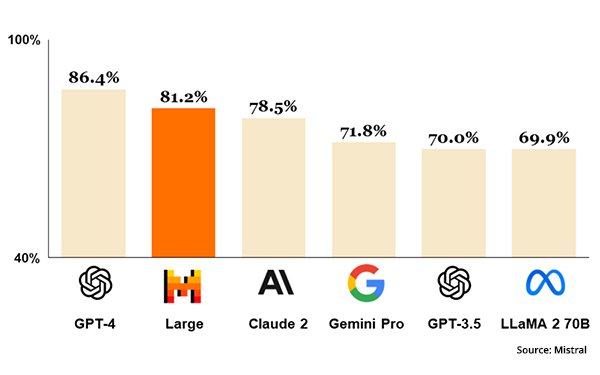by Laurie Sullivan , Staff Writer @lauriesullivan
Source: www.mediapost.com, February 2024
A Microsoft-backed generative AI company, Mistral, on Monday unveiled a new model that the company’s founder Arthur Mensch, a former Google employee, said can perform some “reasoning” tasks comparably with OpenAI GPT-4, and Gemini Ultra.
Mistral’s GAI model, Mistral Large, is open-sourced and being made available on its platform and through Microsoft Azure Cloud services, the company’s first distributor partner.
Brad Smith, Microsoft president, announced new AI Access Principles at the Mobile World Congress in Barcelona. This was part of the effort to address Microsoft’s growing role and responsibility as an AI innovator and market leader.
“This new AI economy is creating not just new opportunities for existing enterprises, but new companies and entirely new business categories,” Smith wrote in a blog post. “The principles we’re announcing today commit Microsoft to bigger investments, more business partnerships, and broader programs to promote innovation and competition than any prior initiative in the company’s 49-year history.”
This occurred several days after Google faced a backlash in response to its AI chatbot Gemini generating ethnically diverse images of historical characters such as Vikings, popes, and even the founders of the company.
Smith announced the investment in Mistral and said the investments and programs announced Monday put the company’s principles into practice — not only in Europe and in the United States, but worldwide.
Mistral Large has native multilingual capacities. It strongly outperforms LLaMA 2 70B on HellaSwag, Arc Challenge and MMLU benchmarks in French, German, Spanish and Italian.
In terms of “reasoning” — the ability to think logically and reach conclusions — Mistral said the model reaches top-tier reasoning capabilities, and can be used for complex multilingual reasoning tasks including text understanding, transformation, and code generation.
Mistral Large achieves strong results on commonly used benchmarks, making it the world’s second-ranked model available through an API next to GPT-4.
Ericsson, a telecommunications services company, describes machine reasoning as an “attempt to implement abstract thinking” and “apply human-like common sense to analyze large amounts of data
Mistral has raised more than $500 million from investors based on that ability. The investors also include Andreessen Horowitz.
And while the funding amount is much less than competitors like OpenAI — which as of December 2023 raised $100 billion — its chances of sailing through privacy and regulatory issues seems more promising. The company is based in France.
Mensch told The Wall Street Journal his model cost less to train — about €20 million — which is the equivalent of roughly $22 million in U.S. currency.
No doubt GAI models in time will become less expensive to build, operate and train, bringing the price down for any business that wants to use the technology.
OpenAI Chief Executive Sam Altman said last year after the release of GPT-4 that training his company’s biggest models cost between $50 million and $100 million.
Mistral has also partnered with enterprise-software company Salesforce and Nvidia, which makes graphics processing units of GPUs that are used to build AI systems.

